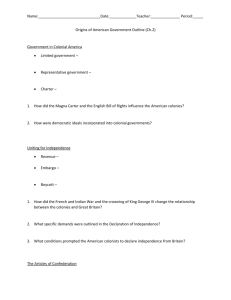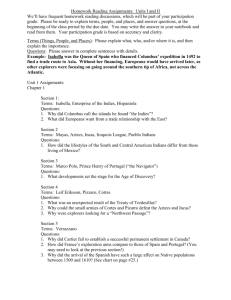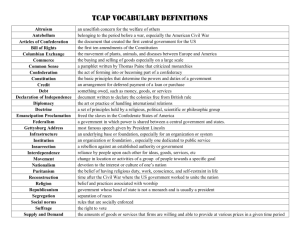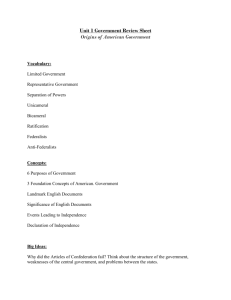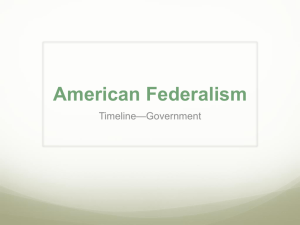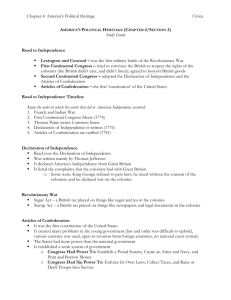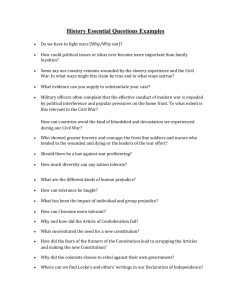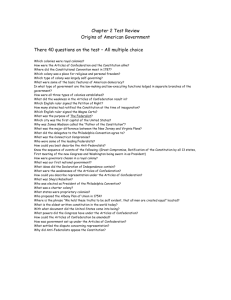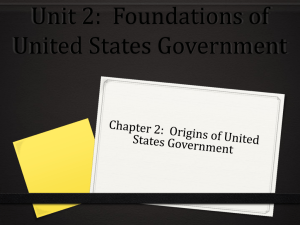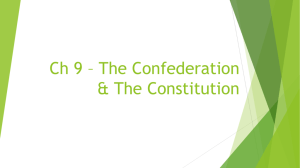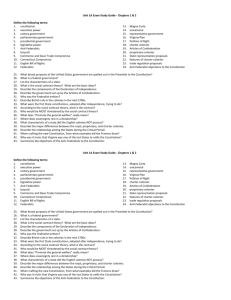Origins of American Government
advertisement
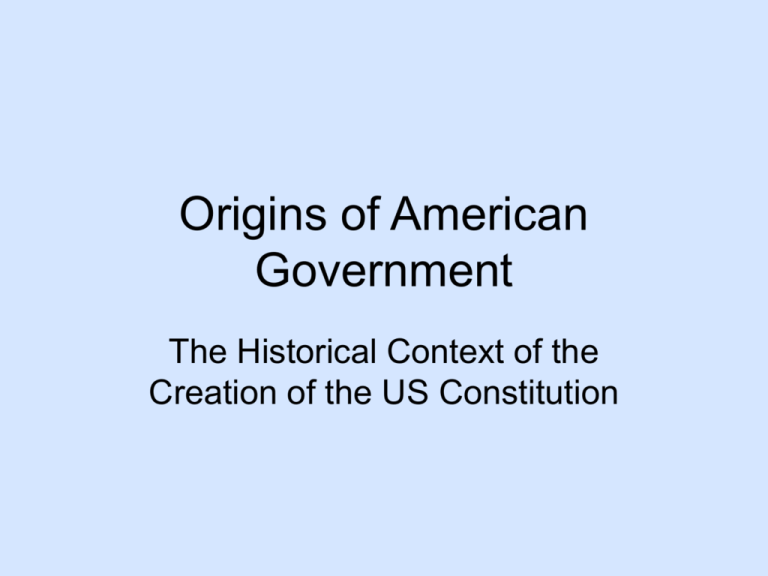
Origins of American Government The Historical Context of the Creation of the US Constitution 13 British Colonies • British traditions of government – ordered, limited and representative • 3 Important Documents • Magna Carta-1215 •trial by jury •due process •private property Petition of Right 1628 • Parliament demanded: – right to a lawful trial – no martial law in times of peace – no quartering of soldiers – taxes approved by Parliament English Bill of Rights 1688 • • • • no cruel punishment no excessive bail or fines right to bear arms right to petition Judeo-Christian Influence • All are equal in the eye’s of God • An individuals can have a direct connection with God. Colonial Governments • Royal Colonies • Proprietary Colonies • Charter Colonies • legislative assemblies • subject to London in theory; self-governing in practice the Coming of Independence • Growing attempts by Parliament to intervene in American affairs – restrictive trade laws – direct taxation • Growing Colonial Unity/Identity – 1643 New England Confederation – 1754 Franklin’s Albany Plan • Stamp Act Congress- 1765 – 1770 “Boston Massacre” – 1772 Committees of Correspondence – 1773 “Boston Tea Party” • 1st Continental Congress- 1774 – response to the “Intolerable Acts” • petition • boycott • prepare to arm 2nd Continental Congress 1775-1781 • Declaration of Independence • functions as government during the war – raised army/navy – borrowed money – bought supplies – created a currency – made treaties • called on states to create state constitutions Characteristics of State Constitutions • popular sovereignty- governments are empowered by/with the consent of the governed • limited government- weak executive power, many restrictions on government action • civil rights and liberties- governments had to respect “inalienable rights” of individuals • separation of power and checks and balancesprevented too much power in the hands of any one or few Characteristics of State Constitutions • generally brief • legislative branch was the most powerful – terms were short – 1-2 years • suffrage was limited – adult, white men, property-owners Massachusetts State Constitution 1780-oldest functioning constitution in the world 1st written national constitution • Articles of Confederation was approved by the 2nd Continental Congress and ratified by all 13 states by 1781. • “a firm league of friendship” textbook, The Critical Period pages 44-45 • Read carefully and prepare a graphic organizer…. textbook, The Critical Period pages 44-45 The Articles of Confederation How was the government to be structured? What powers were given to Congress? What obligations did states have? What were the weaknesses of the document? • Revolutionary War ended 1781 – huge war-time debt • more than $60,000,000 – excluded from British trade empire – not recognized by foreign governments – devalued currency • inflation – shipping no longer protected by British navy • Squabbling States Squabbling States • states are independent and competitive – militias – currency – foreign treaties – trade barriers – boundary disputes Shays Rebellion 1786 Calls for Reform • Mt Vernon meeting encourages Virginia General Assemble to call for a joint meeting of all states to discuss trade. • Annapolis meeting calls for a meeting in May of 1787 in Philadelphia which will become the Constitutional Convention Simulation Scenario • The Administration and School Board have been “overthrown”. No central authority exists. • Teachers have been stripped of their power of “authority” but are not required to stay. • All young people under the age of 19 must remain on campus 8 hours a day. • At age 19, you are no longer allowed on campus. • All jobs require schooling beyond high school and entrance to such schooling is exceedingly competitive. Consider the following: • Are there rights? – How will they be assured? What are the important values to be protected? • How will the individual’s voice be heard? • How will the peace be kept? • Who will rule? • Who will mediate conflict? • Who will carry out the rules? • What obligations does the individual have? • Will educational services be provided? – How? Constitutional Convention • Your group may send up to 3 delegates. • Task: Create a document that will serve as the basis for law and that will establish the structure of the new government. – Include: • Purpose of document; statement of principles • Structure of the government • Distribution of power
